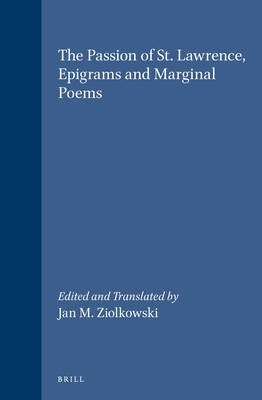
- Afhalen na 1 uur in een winkel met voorraad
- Gratis thuislevering in België vanaf € 30
- Ruim aanbod met 7 miljoen producten
- Afhalen na 1 uur in een winkel met voorraad
- Gratis thuislevering in België vanaf € 30
- Ruim aanbod met 7 miljoen producten
Zoeken
The Passion of St. Lawrence, Epigrams and Marginal Poems
€ 436,95
+ 873 punten
Omschrijving
Nigel of Canterbury (often referred to as Nigel Wireker or Nigel de Longchamps) was a monk of Christ Church, Canterbury, during the troubled decades after the martyrdom of Thomas Becket. Nigel is widely known for his Speculum Stultorum, an amusing satiric poem nearly four thousand lines in length, and for a caustic treatise that has been given the title Tractatus contra Curiales et Officiales Clericos. Although his seventeen Miracula Sancte Dei genitricis uirginis Marie, uersifice have been edited recently, not all his other works have fared well.
The Passion of St. Lawrence, Epigrams and Marginal Poems brings into print for the first time Nigel's remaining poems. From British Library Cotton Vespasian D xix are edited his account in rhymed hexameters of the passion of Saint Lawrence and thirteen epigrams; from Cambridge, Trinity College B. 15. 5 (342) are published newly discovered marginal poems that shed light upon his techniques of poetic composition.
The volume opens with a general introduction on Nigel's writings, his life at Canterbury, and notable features of his verse. Each of the three texts or sets of texts is preceded by a brief introduction and followed by a detailed commentary, which glosses difficult words and constructions and which points the reader to literary sources and analogues. The volume concludes with indexes of names and of notable words.
This new edition deepens our perspective upon Nigel of Canterbury and upon intellectual life in Canterbury after the death of Becket.
The Passion of St. Lawrence, Epigrams and Marginal Poems brings into print for the first time Nigel's remaining poems. From British Library Cotton Vespasian D xix are edited his account in rhymed hexameters of the passion of Saint Lawrence and thirteen epigrams; from Cambridge, Trinity College B. 15. 5 (342) are published newly discovered marginal poems that shed light upon his techniques of poetic composition.
The volume opens with a general introduction on Nigel's writings, his life at Canterbury, and notable features of his verse. Each of the three texts or sets of texts is preceded by a brief introduction and followed by a detailed commentary, which glosses difficult words and constructions and which points the reader to literary sources and analogues. The volume concludes with indexes of names and of notable words.
This new edition deepens our perspective upon Nigel of Canterbury and upon intellectual life in Canterbury after the death of Becket.
Specificaties
Betrokkenen
- Uitgeverij:
Inhoud
- Aantal bladzijden:
- 336
- Taal:
- Engels
- Reeks:
- Reeksnummer:
- nr. 14
Eigenschappen
- Productcode (EAN):
- 9789004088658
- Verschijningsdatum:
- 1/12/1993
- Uitvoering:
- Hardcover
- Formaat:
- Genaaid
- Afmetingen:
- 162 mm x 245 mm
- Gewicht:
- 725 g

Alleen bij Standaard Boekhandel
+ 873 punten op je klantenkaart van Standaard Boekhandel
Beoordelingen
We publiceren alleen reviews die voldoen aan de voorwaarden voor reviews. Bekijk onze voorwaarden voor reviews.







